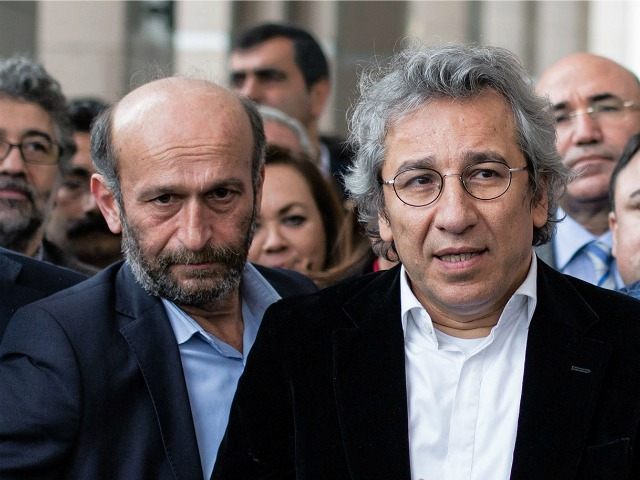Two Turkish opposition journalists are facing life in prison without the possibility of parole for a story that accused the government of supplying weapons to Islamist rebels in Syria.
The defendants are, in essence, charged with orchestrating a conspiracy to overthrow the Turkish government. Critics of the Erdogan regime’s crackdown on opposition journalism view the treatment of these journalists as an assault on free speech and human rights.
Those critics include European Union Enlargement Commissioner Johannes Hahn, who said he was “shocked” by the sentence Turkish prosecutors requested, adding that Turkey must “ensure full respect of human rights, including freedom of expression” as it negotiates European Union membership.
The UK Guardian also quotes Emma Sinclair-Webb of Human Rights Watch, who declared:
We are absolutely clear that Can Dundar and Erdem Gul, in publishing stories on that subject, were doing their job as journalists and nothing more than that. Turkish political leaders, especially the president, have showed an unprecedented willingness over the last years to create a climate of fear for their critics and demonize their opponents.
Press freedom groups held a vigil outside the jail where Dundar and Gul are held, demanding their immediate release, with a statement from Reporters Without Borders seeking to turn the tables against the prosecutors by accusing them of “culpable cruelty.”
The Guardian also notes that Vice President Joe Biden criticized the intimidation of opposition journalists while visiting Istanbul last week and met with imprisoned journalist Can Dundar’s family, a meeting described as “hugely irritating” to the Turkish government.
Dundar and Gul are the editor-in-chief and Ankara bureau chief, respectively, of the Cumhuriyet daily newspaper. They were arrested on November 26 for the May publication of “a story on trucks owned by the National Intelligence Agency (MİT), Turkey’s state intelligence agency, which were stopped and searched in southern Turkey in early 2014 while allegedly carrying weapons to opposition forces fighting against the Syrian regime,” as explained by Hurriyet Daily News.
Cumhuriyet released footage of the police opening crates from the intercepted trucks to reveal weapons and ammunition. President Recep Tayyip Erdogan personally filed a criminal complaint over this footage, claiming it was “not factual,” but later giving a speech where he said it would not make a difference if it was factual or not because releasing the footage was still “treason.”
The head of the MIT, Hakan Fidan, is also named as a plaintiff in the case against the journalists.
Erdogan vowed that the authors of the story would “pay a heavy price,” and it looks as if the price his prosecutors will extract from Dundar and Gul will be heavy indeed. They have asked for an aggravated life sentence, an ordinary life sentence, and a bonus 30-year sentence against each defendant – the kind of combined sentencing the Guardian notes is normally reserved for violent crimes in Turkey.
The charges include disclosing state secrets for “espionage purposes,” aiding a terrorist organization, and seeking the violent overthrow of the Turkish government. The coalition of press freedom groups demanding Dundar and Gul’s release says the details of these charges are “unclear” because the defendants have not been allowed to review the indictments against them. The pair have also been denied visitation rights beyond immediate family members, members of the Turkish Parliament, and their lawyers, as well as being held in solitary confinement until earlier this month.
Today’s Zaman also points out the vague nature of the allegations against the journalists, noting that the “terrorist organization” they supposedly aided, FETO, might not even exist.
The prosecution also sought to loop the Cumhuriyet duo into a massive bribery and corruption probe stretching back to 2013, without any concrete evidence. Today’s Zaman says most of the “concrete evidence” presented in the case is more accurately described as “journalism” – reports and interviews the government does not like opposition papers publishing.
Quite a bit of the “evidence” against Dundar is his thick portfolio of articles criticizing Erdogan, described as the “esteemed President” in the indictment. Dundar is still launching anti-Erdogan broadsides from his prison cell, including an interview two weeks ago in which he denounced the crackdown against opposition journalists as the worst in Turkish history.
“We always looked at the European Union as an anchor, a model to raise the standard of democracy in Turkey to universal levels, not as leverage to dictatorships,” Dundar told the UK Guardian, adding:
Now, if the EU, in order to stop the influx of refugees by turning our lands into a big concentration camp, agrees to turn a blind eye while Erdoğan spurns democracy, human rights, freedom of press and rule of law, it means that the EU is discarding its founding principles in order to protect its short-term interests.
The Guardian notes that its reporters were not allowed to see Dundar; its “interview” was conducted by relaying questions through his lawyers, who returned with the imprisoned editor’s handwritten responses.
Dundar bought up this Hannibal Lecter treatment in his third-party conversation with the Guardian. “We have been in prison for 45 days, under conditions fit for a serial killer, yet we still don’t know our charges,” he said. “Delaying the bill of indictment is a tactic frequently used by the Turkish judicial system in order to punish the detainee in advance.”
Dundar noted there is a “positive correlation” between the lawless activities of a government and the number of journalists it throws in prison:
As the number of dirty affairs, corruption, unlawful arms trades and extrajudicial killings go up, the journalists who write or that have the potential to write about these deeds become targets. Their imprisonment is an intimidation to the other journalists. Throw one in [jail] and silence a hundred.
We may wonder how many will be silenced if two are thrown in jail for life, without parole, by what Dundar charges is a “fascist government,” accepted all too readily by a European Union that should know better.

COMMENTS
Please let us know if you're having issues with commenting.